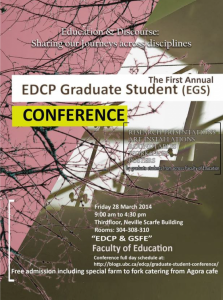The Education Graduate Students (EGS) Conference is an annual conference organized by students from the Department of Curriculum and Pedagogy (EDCP) in the Faculty of Education, UBC. The main purpose of the conference is to showcase the work undertaken by graduate students within the Faculty of Education.
2025
Theme: Cultivating Togetherness: Envisioning Transformative Pedagogy for a Shared Future
Friday, March 21, 2025 | 11:30 a.m. onwards | Room 310, Scarfe Building

Download a copy of the EGS 2025 poster
The Education Graduate Students (EGS) Conference, an annual event organized by the students of the Department of Curriculum and Pedagogy, is set to take place once again. We welcome and encourage participation from all departments within the Faculty of Education. The main purpose of the conference is to showcase the work undertaken by graduate students in all its diversity of subjects and conceptual approaches to theory and practice. This event is also intended to provide a community space for participants to receive feedback from peers, and an opportunity to practice in preparation for national and international conferences.
The theme for this year’s conference is Cultivating Togetherness: Envisioning Transformative Pedagogy for a Shared Future
What does it mean to be together, to think together? In a climate of socio-political divisiveness, hyper-individualism, and violence (of varied kinds), how might we imagine togetherness intentionally and educationally, especially when “living together, however difficult it may be, remains an ethical and political imperative” (Butler, 2015, p. 27)?
This year’s theme of ‘Cultivating Togetherness: Envisioning Transformative Pedagogy for a Shared Future’ invites us to examine as much as imagine the role of education and of teachers in building communities of resilience, hope and change, built on foundations of justice, equity and solidarity. Drawing from but not limiting to UNESCO’s (2024) vision of transformative education, the 12th EGS Conference seeks to explore how education can be a powerful tool to bridge divides, amplify marginalized voices, and strengthen collective well-being.
Togetherness implies relatedness, a being in and with the world that is crucial to educational work, particularly as it increasingly becomes inseparable from any vision for a shared human future. Envisioning the future, and not only preparing for it, requires us to bear witness to the past and the present it has shaped in particular ways, and attempt a reflective leap of imagination, which can “defamiliarize the familiar taken-for-granted and allow us to see it in a different light” (Greene, 2007, p. 2). In doing so, we interrupt and disrupt the status quo and our “worn indifference”, and create authentic openings to become otherwise, and engage in transforming ourselves and the world. As we weave our educational efforts to confront world challenges, the Conference represents an opportunity to explore pathways for embedding sustainability, critical thinking, and ethical responsibility into educational practices.
References
Butler, J. (2015). Notes toward a performative theory of assembly (1st ed.). Harvard University Press. https://doi.org/10.4159/9780674495548
Greene, M. (2007). Imagination and the healing arts. Maxine Greene Institute Library. https://maxinegreene.org/uploads/library/imagination_ha.pdf
2024
Theme: Weaving Stories, Creating New Realities for Empowerment and Resilience
Friday, March 15, 2024 | 12:00 – 5:00 p.m. | In-person
Scarfe 310 (Opening), Scarfe 202 & 1214 (Presentations)
Keynote Speakers | Dr. Kedrick James and Dr. Wayne Ross
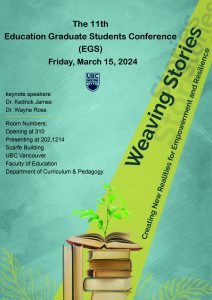
Download a copy of the EGS 2024 poster
The Education Graduate Students (EGS) Conference, an annual event spearheaded by the students of the Department of Curriculum and Pedagogy, is set to take place once again. We welcome and encourage participation from all other departments within the Faculty of Education and other schools and faculties. The main purpose of the conference is to showcase the work undertaken by graduate students in all its diversity of subjects and conceptual approaches to theory and practice. This event is also intended to provide a community space for participants to receive feedback from peers, and an opportunity to practice in preparation for national and international conferences.
The theme for this year’s conference, “Weaving Stories: Creating New Realities for Empowerment and Resilience,” was chosen with careful consideration of the current global context. This is an invitation to explore the educational processes that can help individuals and communities to articulate their narratives, fostering resilience and empowerment.
Our stories and experiences intertwine within the tapestry of human existence, shaping our lives and the state of the world. We are not mere spectators in the theatre of life; instead, we actively script and enact our narratives, influencing the environment and shaping our perspectives. Our stories transcend personal anecdotes, serving as the lens through which we interpret a world currently in crisis due to war, political unrest, environmental crises, human rights violations, and diverse forms of inequality. As Fulford (1999) insightfully observed, “Storytelling is an attempt to deal with and at least partly contain the terrifyingly haphazard quality of life” (p. 14). Despite the prevailing chaos, education provides powerful tools to acknowledge and amplify unheard and suppressed voices, and rights that are denied, along with narratives that are often overlooked. This concept finds resonance in the words of Carl Leggo, who underscores the transformative potential of storytelling as a means to open up new possibilities for understanding, wisdom, and transformation (Leggo, 2008).
This call is an invitation to delve into the educational processes that can support us in articulating the narratives, thereby fostering resilience and empowerment in a world of chaos.
In this context, we invite presentations that delve into the following inquiries. Please note that these guiding questions are not limiting, and we welcome a broad range of perspectives:
- In what ways can innovative educational approaches foster a sense of empowerment and agency in turbulent times?
- How can educators and learners use narrative competence to navigate and make sense of complex, often contradictory global narratives?
- What role does critical thinking play in helping learners discern their paths and voices in a world filled with diverse and sometimes conflicting messages?
References:
Fulford, R. (1999). The triumph of narrative: Storytelling in the age of mass culture. Leggo, C. (2008). Narrative inquiry: Attending to the art of discourse. Language and Literacy, 10(1). https://doi.org/10.20360/G2SG6Q
2023
Theme: Crossing Boundaries Beyond Borders
March 24, 2023 | 12:00 – 5:00 p.m. | In-person
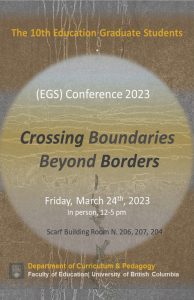
Download a copy of the EGS 2023 poster
This year’s theme Crossing Boundaries Beyond Borders challenges us to reflect on the boundaries of our own research in our graduate school journey. We welcome you to share with us the way in which you challenge boundaries in relation to your scholarship toward developing the discourses affecting global, environmental, societal, political, educational, and cultural awareness. The sharing of our research helps us to break down the limitations of our knowledge and keep up with the ever-changing world around us.
Borders and boundaries are concepts that can be metaphorically interpreted in multiple fields. A border is both a containment and an expansion of multiple boundaries. Borders have been used as geographical concepts designating the formal political division line between territorial units, such as the state while boundaries are a new terminology conceptualized in modern times as a means of expressing territorial power balances (Szary, 2015; Warf, 2010) and representing cultural and social differences that are not necessarily marked by division lines. The concept of boundaries has been employed in different political, social, and cultural contexts. One could experience them when entering a new place, community, or profession. Boundaries can be ethical, psychological, emotional, and personal.
In educational settings, borders and boundaries reflect the different levels at which continuity and change occur. Borders can delineate curriculum jurisdictions, age appropriateness, or subject areas. Boundaries can be pushed where grades and subjects overlap and schools encroach on homes through remote learning.
References: Szary, A. L. A. (2015). Boundaries and borders. The Wiley Blackwell companion to political geography, 11-25. Warf, B. (2010). Encyclopedia of geography. Sage. https://doi.org/10.4135/9781412939591
2022
Theme: Inhabiting In-betweenness
March 18, 2022 | 12:00 – 5:00 p.m. | Hybrid (Zoom and In-person)
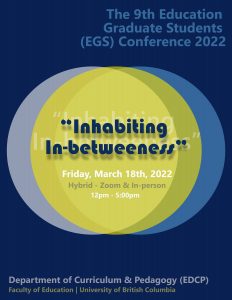
Download a copy of the EGS 2022 poster
This year’s theme is Inhabiting In-betweenness. We invited participants to consider the following comments on the theme. As we find ourselves surrounded by discourses pertaining to time, change, globalization, colonization, access, and power, all of which influence collective ecological, societal, and cultural awareness, how do we reflect upon our thoughts, actions, and responsibilities as educators, scholars, and persons?
Considering in-betweenness is an invitation to dwell in and push against definitions of bodies, borders, and boundaries that have since their inception been fraught with violence and misunderstandings. Often, what we know and understand about education and learning can be difficult to name. This is because how we perceive and experience in-betweenness changes. Following bends, curves, intersections, and parallels, our theme embraces the importance of both, “generation and dissolution in a world of becoming where things are not yet given” (Ingold, 2015) and awareness of the often invisible forces of attunement that prioritize lingering, feeling, sensing, and thinking as knowledge creation (Irwin, 2003).
In-betweenness travels across disciplinary distinctions absorbing conceptual richness like a heavy, dripping sponge. Real learning processes are enormously complex and as such considering what happens outside, alongside, and in-between spaces is important to better understand discourses and practices in education (Fenwick, 2010). We invited this year’s presenters to generate movement with and around what calls them to move outside, underneath, beneath, besides, and in-between one or more ideas in education, curriculum, and/or pedagogy.
View the 2022 EGS conference program.
View photos and more info.
2021
Theme: Transformation and Translation: Curriculum and Change
March 19, 2021 | 12:00 – 4:15 p.m. | Online
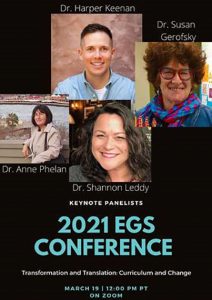
Download a copy of the EGS 2021 poster
The theme for this year’s conference was Transformation and Translation: Curriculum and Change. The participants presented their thoughts on changing situations in education and discussed how they could productively engage with them.
The conference had consisted of four sessions. Dean Blye Frank opened the conference with warm regards. The EDCP Head Prof. Samson Nashon addressed the participants with the speech titled: COVID-19 Pandemic: Implications for the Educated Citizen. The EDCP graduate advisory committee chair Dr. Marina Milner-Bolotin welcomed the graduate students. The second part was the panel discussion. Drs. Anne Phelan, Harper Keenan, Shannon Leddy, and Susan Gerofsky from the EDCP department presented their thoughts on this year’s theme: Transformation and translation. Each panelist elucidated the subject by providing theoretical insights, describing their academic career, Indigenous perspectives on transformative practices, and interdisciplinary classroom ideas. The conference’s third session consisted of the concurrent break-out sessions, two panels, and a workshop followed by two simultaneous panels. In the sessions, a total of 15 presenters (all graduate students) shared their research. The conference has wrapped up with thanks to those who were able to participate.
This year’s conference attracted 54 participants, some of whom were located overseas despite facing the challenge of navigating different time zones. A few of the participants were incoming graduate students who took full advantage of the conference’s online format and had a unique opportunity to get to know their future peers in advance. The 14 graduate student volunteers helped organize the conference, including doing peer reviews and moderating conference panels. With such an excellent environment, the 8th EGS conference was a great opportunity for all participants to get positive and productive feedback from peers and faculty members, refresh their thoughts, and get inspired.
View the 2021 EGS conference program.
2020
Theme: Place & Space
April 22, 2020 | 12:00 – 4:15 p.m. | Online
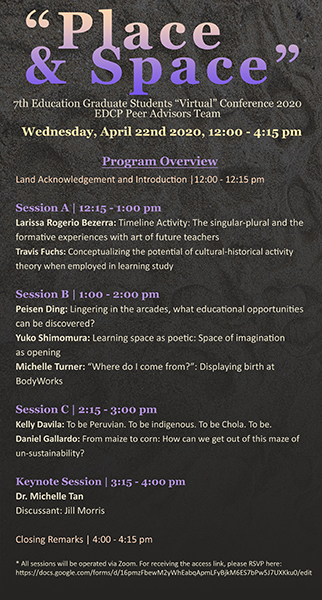
2019
Theme: Conversation as Potentiality
March 15, 2019 | 1:00 – 5:00 p.m
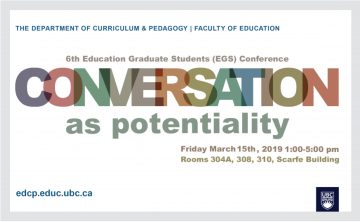
2018
Theme: Tangled Relationship Between Curriculum and Pedagogy and the Complexities Within Theoretical and Practical Contexts
March 9, 2018 | 1:00 – 5:00 p.m.
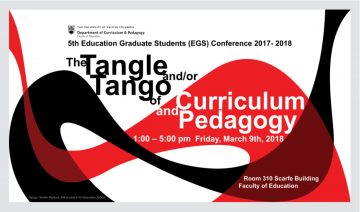
This year’s theme is devoted to the tangled relationship between curriculum and pedagogy and the complexities within theoretical and practical contexts. If we personify these two concepts, the relationship can resemble the dynamism, fluidity, and momentum of two people dancing a tango. In the famous vignette in the movie Scent of a Woman (1992), Frank and Donna dance the tango, accompanied by the music Por una Cabeza. The music’s forte and piano melodies propel the entanglement of dancers, who are immersed in the moment of histories, space/place, subjectivities, and sensations.
Inspired by the tango dance, we title this year’s EGS The tangle and/or tango of Curriculum and Pedagogy and we consider the complexities of “curriculum” and “pedagogy” as graduate students working in a department that is marked by the relationship of these two concepts.
Opening the conversations of the day will be a discussion panel composed of EDCP faculty members, addressing the questions: What are scholars in curriculum and pedagogy entangled in?, What are they tangling with in their discipline(s)/field(s) of study?
2016
Theme: Pedagogical Forces: Navigating Theory and Practice
March 4, 2016 | 2:00 – 6:00 p.m.
View the 2016 EGS Conference program.
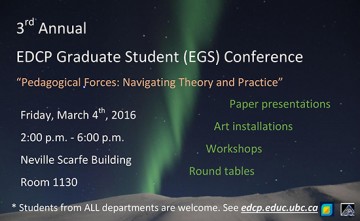
2015
Theme: Exploring the Spaces within Education: Learning in, with and about Education
March 20, 2015 | 9:00 a.m. – 4:30 p.m.
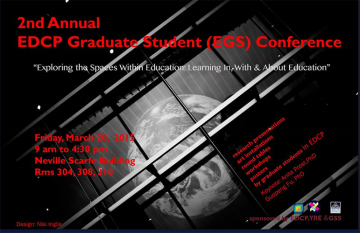
2014
Theme: Education and discourse: Sharing our journeys across disciplines
March 28, 2014 | 9:00 a.m. – 4:30 p.m.
The first annual EDCP Graduate Student conference became the successful student initiative in 2014 which brought together more than 60 graduate peers and student researchers from across disciplines in the domain of Education. The committee of 2014 was led by EDCP graduate student volunteers who worked hard for four months from reviewing and organizing submissions to planning the conference event.
The General Theme for EGS Conference 2014 was “Education and discourse: Sharing our journeys across disciplines”. The conference presentations were in the contemporary formats of paper presentations, posters, panels and symposia, art work, poetry, ritual, media, workshop and roundtable discussions.
View 2014 EGS photos and more information
